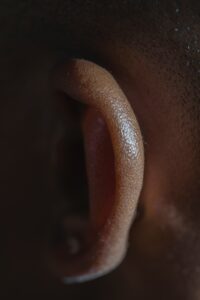Colds, Flu, Allergies And Your Ears

Colds, Flu, Allergies And Your Ears
Colds, flu, allergies, and your ears are all things to be concerned about.
The Ear’s Components
Your ears are amazing little “machines” with three sections that help with hearing and balance. Disease and allergies can impact the outer, middle, and inner ear.
In addition to the ear canal, the exterior part of the ear is included in the term “external hearing.”. It can grow bloated or red when you are ill.
Located in the middle ear is the Eustachian tube, is the most commonly infected area. This portion of the ear functions similarly to a pressure release valve or drainage tube. When mucus clogs it, pressure rises, and hearing becomes harder.
The labyrinth, or inner ear, is filled with fluid. It can also become infected, resulting in dizziness, ringing in the ears, or issues with balance.
Allergies, Infections, And Hearing Problems
Otitis media, middle ear infection, is the medical word for this condition., is most commonly caused by allergies and colds. The middle ear lining becomes irritated after a few days of having a stuffy or runny nose. This can result in a blockage of the Eustachian tube, causing ringing in the ears, a feeling of fullness, or congestion. This blockage can occasionally result in conductive hearing loss, a temporary loss of hearing. After a cold or allergy is over, it normally fades away on its own.

Congestion from the illness can also cause conductive hearing loss. This is also something that usually goes away on its own. On the other hand, the flu can induce a more significant hearing impairment known as sensorineural hearing loss.
This is caused by damage to the inner ear nerves, which send sound impulses to the brain. This occurs when the flu virus infects the inner ear. If not addressed early, usually within two days, sensorineural hearing loss can be irreversible. Diagnosis, however, is challenging. If you have the flu and suddenly lose your hearing, call your doctor right away.
Cold and allergy medications
Antihistamines and decongestants can help alleviate ear pressure and the sensation of fullness. A warm compress can also be beneficial. If an infection exists, the doctor will prescribe an antibiotic. Ear pain can be relieved by over-the-counter pain medications.
Because the ears, nose, and throat are so tightly linked, problems in one area sometimes lead to problems in the others. That’s why a stuffy nose and plugged ears are typical during a cold, flu, or allergies. Hearing loss is usually transient, but a visit to a hearing healthcare professional is necessary if issues persist.
This is why when you put something in your ear, you cough.
It’s best not to put anything in your ear. This also applies to cotton swabs, earwax removers, and ear candles, which, although not technically entering the ear canal, can discharge wax that does. Ear candles, on the other hand, do not.
The American Academy of Otolaryngology recommends against putting anything smaller than your elbow in your ear canal unless you want to risk hearing loss or a perforated eardrum. It’s anyone’s guess how to get something more significant in there.
An involuntary cough reflex, named after the man who first described it, Friedrich Arnold, a 19th-century German scholar, is a lesser-known side effect of placing objects in your ear.
What Is The Connection Between Coughing And Your Ear Canal?
It’s all connected to the vagus nerve, which runs from the brain to the torso and connects to the heart, lungs, and other organs along the way. It is in contact with the auricle, controls the larynx, and extends to the stomach and lower intestines. Like the word “vagabond,” its name stems from the Latin word meaning “to wander.”
The vagus nerve controls your cough reflex as well as many other critical activities that allow you to go about your daily life, such as talking, eating, breathing, and peeing.
The Arnold nerve, which extends to the ear canal, is essential for processing the sense of touch. The Arnold’s nerve is triggered when something enters your ear, whether it’s a cotton swab or a wayward cockroach.
Surprisingly, this stimulation can also make you cough on order. This is an illustration of a biological issue or confusion. The brain becomes confused and misidentifies the ear contact for something in the throat, leading you to cough to remove the stimulus.
The Arnold nerve is a nerve that connects the ear canal to the brain and can transmit touch sensations. However, because the nerve is attached to a neuron that leads to the throat, the brain may be confused and interpret the feeling as something in the throat that needs to be coughed up.
This Also Works In The Opposite Direction.
“Similarly, a throat irritation, such as a viral ulcer or a malignant tumour, may be interpreted as ear pain because the glossopharyngeal nerve sends those sensations back to the brain, but the brain doesn’t know where the sensation is coming from and interprets it as ear pain,” Voigt explained.
“I’ve discovered deep tongue base and laryngeal cancer in folks who came to me with an earache. When I inspected the ear, everything was normal, then I used my laryngoscope to examine the base of the tongue and throat and discovered the malignancy there.”
Returning to the ear cough reflex. The amount of pressure required to elicit this response varies from person to person.
“In some persons, gentle touch stimulation can readily elicit the cough response, whereas, in others, deep, strong pressure or contact is required,” Voigt explained.
In a 2017 study, researchers studied this somewhat peculiar phenomenon by tickling the external auditory canal with a cotton swab of adults and children with and without persistent coughs. The stimulation elicited Arnold’s ear cough reflex in 25% of adults and 3% of children with chronic cough. In comparison, just 2% of adults and children who did not have a persistent cough did so.
Arnold’s ear cough reaction is possible, but not prevalent in people without a persistent cough, according to the results of this study. According to the researchers, this is caused by a vagus nerve hypersensitivity reaction (cough hypersensitivity syndrome, CHS) induced by a viral respiratory illness or environmental variables.
It is currently an infrequent cause of chronic cough. However, there is accumulating evidence that both chronic and idiopathic cough may be associated with a vagus nerve injury in many cases. Cough, for example, is a common adverse effect of vagus nerve stimulation, a treatment for epilepsy. Furthermore, there is evidence to suspect that the tone and rhythm of the cough may differ depending on the particular location of the damage.
All of this demonstrates how the body is interrelated in unexpected ways. So much so that (for some) a seemingly unimportant event in the ear might cause coughing fits.





